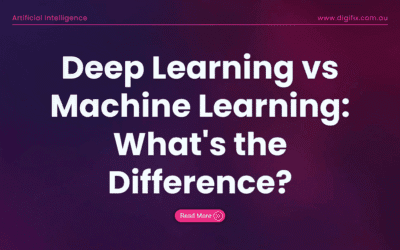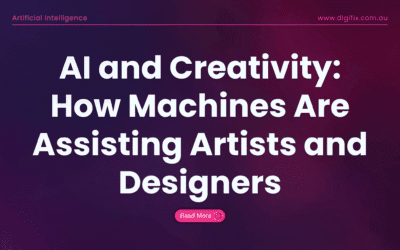At DigiFix, we see how Artificial Intelligence (AI) is changing healthcare. AI is making medical care better and more personal. It lets doctors give personalised treatments that really meet each patient’s needs.
In Melbourne and other places, businesses are using AI to innovate and work smarter. As a top AI agency, DigiFix helps healthcare teams use AI. This improves how well patients do and makes things run more smoothly. In this blog, let’s discuss the role of AI in personalised healthcare treatments.
Key Takeaways
- AI is revolutionising healthcare through personalised treatments.
- DigiFix offers AI automation services to enhance patient care.
- Personalised medicine improves patient outcomes and operational efficiency.
- AI integration is driving innovation in the healthcare sector.
- Healthcare providers can leverage AI to gain a competitive edge.
The Role of AI in Personalised Healthcare Treatments
The healthcare sector is changing fast with the rise of personalised medicine. This change comes from new AI healthcare solutions and artificial intelligence healthcare. These advancements help make treatments more precise and effective.
Personalised healthcare means treatments are made just for each patient. It moves away from the old one-size-fits-all method. This new approach is not just about treating illnesses. It’s also about preventing diseases and improving overall health.
From Standardised to Individualised Care Approaches
The old healthcare model often uses the same treatment for everyone. But personalised medicine uses data and analytics for custom plans. AI technologies help by looking at lots of patient data to find patterns and predict results.
DigiFix helps healthcare providers switch to personalised care with Custom AI Strategy Sessions & Implementation Plans. This support is key for organisations wanting to add AI to their healthcare systems.

Australia’s Position in the Global Personalised Medicine Landscape
Australia is leading the way in personalised medicine globally, with big investments in healthcare tech. The country’s healthcare is using AI healthcare solutions to better patient care and results.
Australia’s strong research and innovative healthcare make it perfect for personalised medicine. By using artificial intelligence healthcare technologies, Australia is set to be a global leader in this change.
Fundamentals of AI Technologies in Medical Applications
In the world of personalised medicine, AI technologies are key to better treatment and care. The healthcare field is changing fast with AI, like Machine Learning (ML), Deep Learning (DL), Natural Language Processing (NLP), and Computer Vision.
Machine Learning and Deep Learning in Clinical Settings
Machine Learning algorithms help make sense of complex medical data. They find patterns that doctors might miss. This is very useful in clinics, where making the right diagnosis and treatment plan is crucial.
Deep Learning, a part of ML, takes it further. It uses neural networks that work like the human brain. This tech is helping doctors get better at diagnosing diseases in many areas of medicine.
Natural Language Processing for Medical Records
NLP is changing how medical records are handled and understood. It pulls out important info from notes that aren’t structured. This makes managing patient data and supporting clinical decisions better.
NLP also helps with patient engagement. It makes it easier for doctors and patients to talk to each other.
Computer Vision in Diagnostic Procedures
Computer Vision is being used more in medical imaging. It helps spot problems in images like X-rays and MRIs very accurately.
Using Computer Vision in diagnosis makes doctors more accurate. It also helps them work less hard, so they can focus on harder cases.
The Role of AI in Personalized Healthcare Treatments
AI plays a big role in making healthcare treatments better. It uses data to help doctors make smarter choices. This leads to better care for patients.
Patient Data Analysis and Pattern Recognition
AI can look at lots of data, like medical records and genetic info. It finds patterns that doctors might miss. This helps in making accurate diagnoses and treatment plans.
- Analysis of electronic health records (EHRs) to identify high-risk patients
- Integration of genomic data to understand genetic predispositions
- Use of wearable device data to monitor patient health in real-time
Tailoring Treatment Protocols to Individual Patients
AI helps doctors create treatment plans that fit each patient. This makes treatments more effective. It also lowers the chance of bad reactions.
- Development of personalised treatment plans based on patient-specific data
- Adjustment of medication regimens according to genetic profiles
- Implementation of targeted therapies for specific patient subgroups
A study on the National Center for Biotechnology Information shows AI’s power in cancer treatment. It shows better results with treatments tailored to each patient.
Continuous Learning and Treatment Optimisation
AI keeps learning from new data. This means it can improve treatment plans over time. Patients get the best care as plans are updated with new research.
- Real-time monitoring of patient responses to treatment
- Adaptation of treatment plans based on emerging data and research
- Identification of best practices through analysis of aggregated patient data
DigiFix offers AI Training & Workshops for healthcare pros. This helps them use AI to improve patient care. With better AI skills, doctors can make a bigger difference.
AI-Powered Diagnostics and Disease Detection
AI is changing how we find and diagnose diseases. It uses smart tech like machine learning to make diagnosis faster and more accurate. This leads to better health outcomes for patients.
Advanced Medical Imaging Analysis
AI helps doctors look at medical images like X-rays and MRIs. Advanced medical imaging analysis lets them spot things they might miss. This makes diagnosis quicker and more precise.
Predictive Diagnostics for Early Intervention
AI predictive diagnostics spot health issues early. This means doctors can act before symptoms show. It helps prevent diseases from getting worse and improves health outcomes.
We provide Custom AI Strategy Sessions. They help healthcare providers use AI diagnostics that fit their needs.
Reducing Misdiagnosis Rates with AI Assistance
AI helps cut down on misdiagnosis. It gives doctors real-time diagnostic support. AI looks at big data to help doctors make accurate diagnoses. This means patients get the right treatment sooner.
Using AI diagnostics can greatly improve patient care in Australia. Our team is ready to help healthcare organisations use AI to change their diagnostic methods.
Genomic Medicine Enhanced by Artificial Intelligence
Artificial Intelligence (AI) is changing healthcare by offering custom treatments. Genomic medicine uses genetic info to diagnose and treat diseases. AI is making this field better by analysing genetic data fast and accurately.
AI’s role in genomic medicine is huge. It’s not just helping us understand genetic disorders better. It’s also leading to more effective treatments.
Genetic Sequencing and AI-Driven Analysis
Genetic sequencing is key in genomic medicine. It’s the process of figuring out DNA’s order. AI is making this process better by:
- Finding genetic changes linked to diseases
- Guessing disease risk based on genes
- Creating treatments that fit an individual’s genes
AI helps doctors understand complex genetic data. This leads to better diagnosis and treatment.
Pharmacogenomics for Medication Selection
Pharmacogenomics studies how genes affect drug responses. AI is making a big difference here. It can predict how a patient will react to drugs, leading to:
- Better drug choices
- Less risk of drug side effects
- Right drug doses based on genes
This approach to medicine is improving patient care and saving money.
Australian Genomics Initiatives and AI Integration
Australia is leading in genomics and AI in healthcare. There are many projects to use AI in genomic medicine, including:
- Research partnerships between schools and companies
- Investments in genomics and AI
- Guidelines for using AI ethically in genomics
These efforts are pushing the field forward. They’re also making Australia a leader in custom healthcare.
AI is taking us towards a future of more precise healthcare. DigiFix is working with healthcare to use AI in genomic medicine. This will improve patient care and results.
Revolutionising Drug Development and Medication Management
AI is changing how drugs are made and used, offering treatments that fit each person. This change is key to better patient care and making the drug-making process smoother.
AI in Clinical Trial Design and Patient Matching
AI is making clinical trials more efficient and effective. It looks through lots of data to find the right patients for trials. This saves time and money.
Some key benefits of AI in clinical trial design include:
- Enhanced Patient Matching: AI finds patients who will likely benefit from a treatment, improving trial results.
- Optimised Trial Design: AI designs trials that work better by predicting how patients will respond and spotting problems early.
- Reduced Costs: AI makes it easier to find patients for trials, cutting down costs.
Our AI services help drug companies use AI in trials and patient matching. This leads to better and cheaper trials. For more on AI in healthcare, check out this article.
Smart Medication Management Systems
AI-powered systems are making it easier for patients to stick to their medication. They send reminders, keep an eye on health, and alert doctors to problems.
The benefits of these systems include:
- Improved Patient Adherence: Personalised reminders and checks can make patients more likely to take their meds.
- Early Detection of Issues: AI spots problems early, allowing for quick action.
- Enhanced Patient Safety: By lowering the chance of bad reactions, AI systems make care safer.
Reducing Adverse Events Through Personalised Approaches
AI is making treatments more personal, reducing bad reactions. This approach leads to better care and outcomes for patients.
Key aspects of personalised care include:
- Genomic Analysis: AI uses genomic data to find the best treatments for each patient.
- Personalised Treatment Plans: AI helps create plans that fit each patient’s needs and health.
- Continuous Monitoring: AI keeps an eye on patient health, adjusting plans as needed.
Telehealth and Remote Patient Monitoring Solutions
AI is changing healthcare, making it better and more personal. It’s making healthcare services more accessible. This is thanks to AI and telehealth working together.
AI-Enabled Remote Diagnostic Tools
AI-enabled remote diagnostic tools are key in telehealth today. They let doctors check and treat patients from afar. AI uses complex algorithms to look at medical data.
For example, AI can check medical images like X-rays. It helps doctors spot health problems more easily.
AI tools can also handle lots of data fast. This helps doctors make quick decisions. It’s especially useful in emergencies.
Wearable Technology and Health Data Analysis
Wearable technology is big in healthcare now. It lets patients’ vital signs and health data be tracked all the time. AI looks at this data to find health risks.
- Continuous monitoring of vital signs
- Early detection of health anomalies
- Personalised health recommendations based on data analysis
Wearable tech and AI help doctors give better care. It makes care more personal and proactive. This improves patients’ lives and health outcomes.
Bridging Healthcare Gaps in Rural Australia
Rural Australia has big healthcare challenges. But, AI-powered telehealth solutions are helping. They make sure patients get the care they need, even if they’re far away.
DigiFix offers AI solutions for telehealth and remote monitoring. They’re key in improving healthcare in Australia, especially in rural areas.
Implementing AI Healthcare Solutions in Australian Medical Practices
Australian medical practices are on the verge of a big change with AI. The healthcare world is changing fast. Using AI is key for better and more personal patient care.
Assessment and Strategic Planning Processes
Starting with AI in healthcare needs a good look at what’s already happening and planning ahead. This means:
- Finding out where AI can help the most
- Checking if current systems can handle AI
- Creating a plan for how to add AI
Using precision medicine AI helps doctors tailor treatments for each patient. This makes care better for everyone.
Integration with Existing Healthcare Systems
It’s important for AI to work well with what’s already in place. This means:
- Checking if AI fits with current health records and IT
- Setting up strong data protection and security
- Helping different healthcare places and systems talk to each other
Working well together lets healthcare teams use AI for AI patient care. This makes diagnosing and treating patients better.
Staff Training and Adoption Strategies
For AI to work well, staff need to be trained and supported. Plans include:
- Teaching staff about AI and how it’s used
- Creating a place where new ideas and tech are welcome
- Keeping support and help available for any issues
By training staff, medical places can smoothly move to AI-based care. For more on AI in healthcare, check out Digifix’s article on AI and the future of work.
Ethical Considerations and Regulatory Frameworks
AI in healthcare needs careful thought about ethics and rules. As AI grows in medicine, we must focus on quality care for patients. This ensures care is always patient-focused.
Patient Data Privacy in the AI Era
AI in healthcare deals with lots of patient data, which raises privacy issues. Keeping patient info safe and private is key. We need strong data protection steps, like:
- Encryption of patient data both in transit and at rest
- Access controls to limit who can view or modify patient information
- Anonymisation techniques to protect patient privacy in AI-driven research and analysis
For more on AI ethics, check out our article on ethical considerations in artificial intelligence.
Addressing Algorithmic Bias in Healthcare Applications
AI can sometimes show biases if trained on biased data. It’s vital to tackle these biases for fair healthcare. Ways to fight bias include:
- Using diverse and representative data for AI training
- Regular checks on AI for bias signs
- Fixing biases found in AI systems
Australian Healthcare Regulations for AI Implementation
Australia has rules for AI in healthcare to keep it safe and effective. These rules make sure AI meets healthcare standards. Key parts of these rules are:
- Following the Therapeutic Goods Act 1989 for AI medical devices
- Following privacy laws, like the Privacy Act 1988
- Guidelines for ethical AI use in healthcare from the Australian Medical Association
By following these rules and ethics, Australian healthcare can use AI to improve care. This keeps trust and follows the law.
Conclusion: Embracing the AI-Driven Future of Personalised Medicine
AI is changing healthcare, making treatments more personal and effective. It helps in many ways, from diagnosing to tailoring treatments. This leads to better health outcomes for patients.
The AI in healthcare market is set to grow to $31.3 billion by 2025. More than 85% of healthcare groups will use AI by 2024. AI helps doctors engage with patients better, makes diagnoses more accurate, and creates treatments that fit each person’s needs.
Healthcare providers can use AI to improve care. They can start their AI journey and offer the best care. This will drive growth and innovation in healthcare.





0 Comments